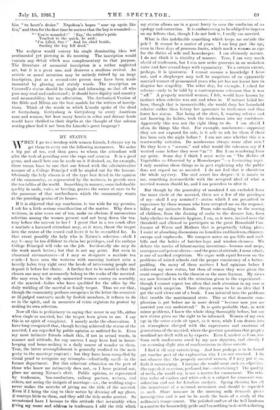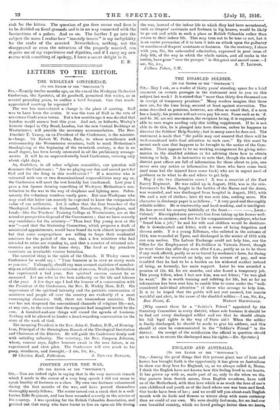MY STATUS.
WHEN I go to a teashop with women friends, I always try to get them to carry out the following inaneeuvre. We order a big pot of tea, and then guess to whom the attendant will allot the task of presiding over the cups and saucers. It is a good game, and small bets can be made on it if desired, as, for example, three cream buns to one that our friend with the administrative manner of a College Principal will be singled out for the honour. Obviously the lady chosen is of the type best fitted in the opinion of tho community, as represented by the waitress, to preside over the tea-tables of the world. Something in manner, some indefinable quality in smile, voice, or bearing, proves the owner at once to be the possessor of that motherliness which the community wants in the presiding genius of its homes.
If it is objected that my conclusion is too wide for my premiss, I ask for a little serious consideration of the matter. Why does a waitress, in nine cases out of ten, make an obvious if unconscious selection among the women present and not bang down the tea- tray before the nearest to her ? I grant that in a tea crush after a matinee a harassed attendant may, as it were, throw the teapot into the centre of the crowd and leave it to be sceambled for. In that event possibly the lady who is Nature's selection—shall I say ?—may be too diffident to claim her privileges, and the embryo College Principal will take on the job. Incidentally she may do the work much better; but that is not my point. But even in abnormal circumstances—if I may so designate a matinee tea crush—I have seen the waitress with unerring instinct raise a heavily laden tray right over the heads of intervening people and deposit it before her choice. A further fact to be noted is that the chosen one may not necessarily belong to the ranks of the married. She may even be the only unmarried woman among an assembly of the married—ladies who have qualified for the office by the daily wielding of the marital or family teapot. Thus we see that, though the community perforce recognizes in the letter the eccentric or ill-judged contracts made by foolish members, it refuses to do so in the spirit, and in moments of crisis registers its protest by making its own selection.
Now all this is preliminary to saying that never in my life, either when single or married, has the teapot been given to me. I say this in no spirit of complaint. I merely make the observation. I have long recognized that, though having achieved the status of the married, I am regarded by public opinion as unfitted for it. Even my most intimate friends admit this, if not in actual words, in manner and attitude, for any success I may, have had in house- keeping and home-making is a daily source of wonder to them. True, the latter accomplishment is generally credited to the male party to the marriage contract ; but they have been compelled by visual proof to recognize my triumphs—admittedly small—in the former department. But this reluctant admission on the part of those who know me intimately does not, as I have pointed out, place me among Nature's elect. Public opinion, as represented by tradesmen, 'bus-conductors, railway porters, waiters, and others, not seeing the insignia of marriage—i.e., the wedding-ring- never makes the mistake of giving me the title of the married. Even if I bring the ring to their notice by drawing off my glove, it conveys little to them, and they add the title under protest. So accustomed have I become to this attitude that invariably when giving my name and address to tradesmen I add the title which my status allows me in a great hurry to save the confusion of an apology and correction. It is embarrassing to be obliged to impress on my fellows that, though I do not look it, I really am married.
What is this indefinable something which keeps me outside the pale ? It cannot be a matter of years. I am long past the age, even in these days of generous limits, which mark a woman as ripe for the duties of wife and housekeeper. I am obviously mature. I do not think it is timidity of manner. True, I am very much afraid of tradesmen, but I can now order groceries in an unshaken voice and face errand-boys with equanimity. To a certain extent, perhaps, it is ignorance. I cannot assume a knowledge I have not, and a shopkeeper may well be suspicious of an apparently married woman of pronounced years who yet has not learnt how to disguise her stupidity. The other day, for example, I asked for celeriac—only to be told by a contemptuous salesman that it was " off." A properly married woman, I felt, would have known by instinct when celeriac was out and when in. If instinct failed her here, though that is inconceivable, she would deny her household celeriac rather than betray her ignorance to tradesmen and than lower her status. Not. being of the elect, I, wanting celerite and not knowing its habits, took the tradesman into may confidence. Apparently this was not the right thing to do. I am afraid I often do things like that. For example, mushrooms—supposing they are not exposed for sale, is it safe to ask for them if there has been rain the night before ? I am not sure whether this is a trustworthy criterion. Do mushrooms always come after rain Do they have a " season," and what would the salesman say if I wanted some before they were "in" ? But I am wandering from my point. Some day I think I must write on " The Habits of Vegetables as Observed by a Housekeeper "—a fascinating topic. I only mention these things as in part. explaining why the public does not regard me as married. I do not feel that it elucidates the whole mystery. The real secret lies deeper—it is innate in me, something irreconcilable with the accepted ideal of what a married woman should be, and I am powerless to alter it.
But though by the generality of mankind I am excluded from the inner circle of the married, there are a few of the privileges of my—shall I say nominal ?—status which I am permitted to experience by those women who have accepted me on the responsi- bility of my intimate friends. From cake-making to the rearing of children, from the darning of socks to the divorce law, from baby-clothes to domestic hygiene, I am, as it were, invited over the threshold and allowed to participate in the great Household Con- ference of Wives and Mothers that is perpetually taking place. I assist at absorbing discussions on laundries and linoleum, chimney. sweeps and cupboards. We compare notes on gas-bills and coal- bills and the habits of butcher-beys and window-cleaners. We debate the merits of labour-saving inventions—brooms and mops, saucepans and patent slicers—and the general attitude, I must admit, is one of marked scepticism. We argue with equal fervour on the problems of mixed schools and the proper consistency of a batter- pudding. On many of these matters I had opinions before I achieved my new status, but then of course they were given the scant respect shown to the theorist or the mere layman. My views are now listened to with the attention given to the experienced-- though I cannot repeat too often that such attention in my case is tinged with suspicion. There always seems to be an idea that I got the said views out of a book. I am initiated into the problems that trouble the matrimonial state. This or that domestic com- plication is put before me in more detail " because now you are married you can understand." It is quite probable that, as with minor problems, I knew the whole thing thoroughly before, but my new status gives me the right to be informed. Women of my own age in the outer circle sit apart, as it wore, while I am drawn into an atmosphere charged with the experiences and emotions of generations of the married, where the greatest questions that perplex mankind arc dealt with as by exports. Even I, unelect as I am, rise from such conferences awed by my new dignities, and already I am assuming slight airs of condescension to those outside.
I find it all very entertaining. And here perhaps is to be found yet another part of the explanation why I am not received. I do not observe that the properly married woman, if I may put it so. finds it entertaining. I imagine she would scout such an adjective. She regards it as serious, profound, but —entertraning ? The quality of coals, she would say, is not a matter for amusement. The rela- tive value of cinders and white-ash is a subject for economic con- sideration and not for frivolous analysis. Spring cleaning has all the importance of a national movement and should be regarded as such. Short measure in the morning milk demands grave investigation and is not to be made the basis of a study of the milkman's temperament. The polished surface of the hall linoleum is a matter for housewifely pride and has nothing to do with a skating rink for the kitten. The question of gee fires tarsus coal fires is to be decided on fiscal grounds and is in no way connected with the fascinations of a poker. .And so on. The further I go into the subject the more I realizeliow "innately innate' is my ineligibility.) for the ranks of the married. N-evertheless, nothing, not the i 'disapproval or even the ostracism of - the properly married, can deprive me of my experiences -and dignities, and if I carry my new status 'with something of apology, I havea-secret -delight in it.
E. B.































 Previous page
Previous page